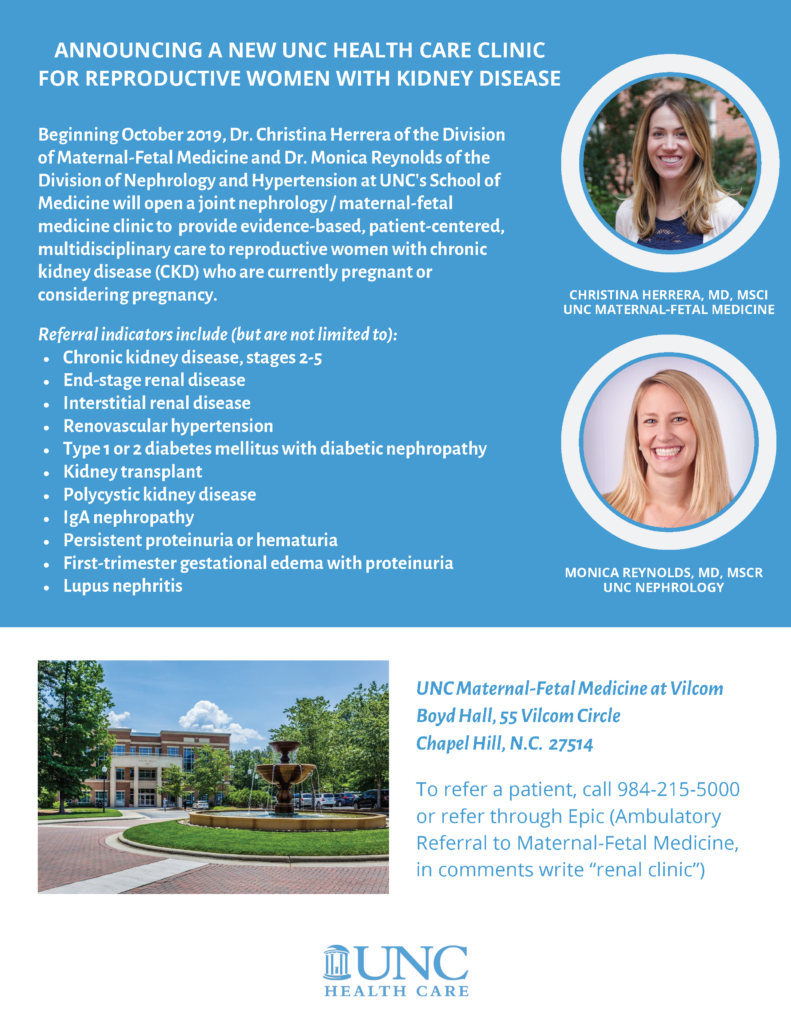This month, Dr. Christina Herrera of the Division of Maternal-Fetal Medicine and Dr. Monica Reynolds of the Division of Nephrology and Hypertension at UNC’s School of Medicine opened a joint nephrology / maternal-fetal medicine clinic at UNC Maternal-Fetal Medicine at Vilcom to provide evidence-based, patient-centered, multidisciplinary care to reproductive women with chronic kidney disease (CKD) who are currently pregnant or considering pregnancy.
To refer a patient, call 984-215-5000 or refer through Epic (Ambulatory Referral to Maternal-Fetal Medicine, in comments write “renal clinic”)
comments write “renal clinic”)
Q: What led you to open this clinic?
A: Caring for reproductive age women with chronic kidney disease (CKD) can be anxiety-provoking for some providers. Data also shows that few women receive counseling from their nephrologist in areas of women’s health, and some women with CKD have felt traumatized when physicians unduly warn against pregnancy.
UNC is a tertiary-care center that serves a large number of high-risk reproductive age women with underlying CKD. Each woman faces unique challenges and requires comprehensive care. This interdisciplinary clinic will provide patient-centered care and improve shared-decision making among the patient, maternal-fetal medicine expert and nephrologist.
Q: What makes pregnancy complicated for women with CKD?
A: Women with CKD are among the highest-risk individuals for adverse pregnancy outcomes with an approximately 10-fold increased risk of preeclampsia, a five-fold increased risk for preterm delivery and small-for-gestational age infants, as well as an almost three-fold risk for cesarean delivery. Pregnancy can be associated with flares of kidney diseases, and in more advanced stages of CKD, a complicated pregnancy can lead to irreversible loss of function and the risk of requiring dialysis in pregnancy or postpartum. We have a limited range of medications we can use in pregnancy and ultimately must take into account both the mother and baby in all aspects of care.
Q: What is the most common chronic kidney disease your patients face?
A: We see a variety of chronic kidney diseases. Both diabetes and hypertension are responsible for a large amount of kidney disease in the United States, and this is likely related to our obesity epidemic. In addition, diseases such as Lupus Nephritis and IgA nephropathy have a predilection for women of childbearing age and are commonly diagnosed prior to, during or shortly after pregnancy.
Q: What are the options for women with chronic kidney disease who would like to have a baby?
Though pregnancy in the setting of CKD is high-risk, we want to help women find a window of opportunity to achieve the safest pregnancy and delivery. This really begins with pre-pregnancy planning. Working to optimize preconception blood pressure, proteinuria and weight can have far reaching effects into pregnancy. For diabetics, this would include managing average blood-sugar levels. For diseases that impact kidneys, this includes making sure the disease is controlled and/or not flaring.
For women who have advanced CKD, options may include waiting to conceive until after a kidney transplant or initiating dialysis while pregnant. Other women may choose gestational surrogacy in order to lower maternal/fetal risks and preserve their kidney function.
Q: What new developments or discoveries are on the horizon for women with chronic kidney disease?
A: Pregnant women are often not included in randomized control trials, so new medications are often deemed unsafe in pregnancy/breastfeeding. However, we are hoping this clinic will give us the opportunity to improve outcomes for reproductive women with CKD and gather evidence for best practices in caring for this unique population.